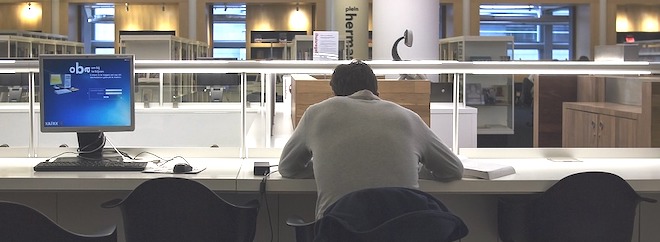Disclaimer
By respect to the virus victims, I don't want to start a flame war on indecency to compare victims with workers. But I think that some reflections could shed a light on a de-facto standard that is polluting businesses as well as employees quality of life.
Also, I totally understand that not everybody has the luxury to think about office working conditions. When you pick and pack items on the conveyor belt at an Amazon depot, this seems indecent to complain about desk work where after all, employees can appear as privileged. But millions of workers are nonetheless concerned about desk-work and millions suffer from their working conditions.
Concept
Open-space work environments have long been seen by a few as a modernity. But in real-world, this is more felt like a plague by most workers.
Few of them will say they favor this kind of environments as they need noise and movement to work, and that they would hate a personal office.
I want to share my experience on this matter.
A lot of studies has been directed and published, and not surprisingly, they can be categorized into two trends: the lovers and the haters.
What is interesting is that the pro and against arguments are not scattered homogeneously among the two groups.
Lovers
- Open-spaces are promoting information sharing.
- Open-spaces fight individualism by breaking down communication barriers
- Open-spaces give a global pictures of what is going one, no-one is left on the side.
Haters
- Open-spaces show a lack of trust on employees.
- Open-spaces spread distractions and diseases .
- Open-spaces decrease productivity.
- Open-spaces violate basic rules of privacy.
- Open-spaces don't allow one to really focus.
The lovers always use what I consider the same shallow auditing companies formatted  arguments: communication. While the haters tend to show a broader and more fine grained set of arguments. Showing some more free thinking and open-mindedness
arguments: communication. While the haters tend to show a broader and more fine grained set of arguments. Showing some more free thinking and open-mindedness
 arguments: communication. While the haters tend to show a broader and more fine grained set of arguments. Showing some more free thinking and open-mindedness
arguments: communication. While the haters tend to show a broader and more fine grained set of arguments. Showing some more free thinking and open-mindedness The main argument.
In my opinion, the first argument is the worst one: open-spaces emulate and promote information sharing and team-spirit buildup.
During my 40+ years career, I was brought to work in different organizations, public administrations, international organizations, startups, corporations, I have observed that the only information shared in open-spaces is yesterday's evening party with your beer buddies, football and your vacation.
Real Information Exchange
The only real space to promote information sharing, team spirit building, is the only space where projects move forwards, where ideas are exchanged: the cafeteria.
No, not meeting rooms which are the modern temples of waste of time and resources, but the cafeteria.
Why is that? Because people meet in an informal manner, without pressure and while chatting, they also hear about other's work, needs, requirements, what they can provide, in what field they are knowledgeable. That's where socializing works at its best.
Also, it's easier in today's pandemic challenge to establish social-distancing rules in a cafeteria, not really in a small meeting room.
Along the course of my career, absolutely 100% of the projects I have seen delivered or make significant progresses, were delivered thanks to the tremendous work done in cafeterias.
I have countless recollections of people spending 5 hours at a table in a cafeteria, exchanging ideas, giving answers to other's challenges, taking notes, sharing experience and knowledge. I have NEVER seen anything like that in open-spaces or in a meeting room.
In those years, I attended only 2 (yes, TWO) useful meetings. Both were held by a Japanese company, Mitsubishi. Probably because they have a more mature culture on efficiency. And Mitsubishi's CEO organized both of them in the hotel lobby... around a coffee table.
The thousands of official meetings I attended in a conference room were all a total waste. Nothing came out of those meetings, except self-congratulating project managers patting themselves on the shoulders while projects did not move an inch.
Now, if you want employees to work efficiently give them an environment where they can thrive, not a place where they feel miserable. It's like providing them a small desk in the middle of New York Central Station at peak hours.
Co-Working
Today, a new market is emerging: co-working. Isn't this the same as an Open-space office after all? Isn't this proof that people absolutely love those environments and promiscuity?
No, I don't think so.
The business model of the WeWorks, Spaces, and the likes is totally different. It's organized as a well-thought cafeteria, where people can meet and can work, share desks, etc... if they want to. Nothing is imposed on them, it's their choice. Nobody is overlooking over their shoulders.
Depending on what I work on, I actually love to go to places like that, but I always first check on the environment, how desks, visitor routes in the place are organized, the level of potential nuisances like noisy printers, slamming doors, and then I decide whether I skip the place and head to another one, or if I get inside and start working. But it's my choice. And it has not been dictated and imposed on me just to follow a trend artificially created by auditing companies to make you look like you are a pro.
Message sent to your precious resources, your employees
Give a choice to your employees. After all, they work for you. You picked them. If you feel that they're not professional and abuse the system, and you have to place them in an open-space to monitor them, you're at fault, you picked a bad apple. It happens to anybody. But why should everybody pay the price for that? They would abuse the system no matter what.
To the ones not at ease with such an environment, open-spaces carry wrong messages: you're cattle, we don't trust you, if you're not happy then leave. (I've heard that so many times, that's the signature of mediocrity).
Give your employees a voice. Besides, it's probably the most effective ROI you'll get.
On the other hand, If some of them actually like open-spaces, build one for them. Even better, build one WITH them. And give separate offices to the other ones. A small one will do, you don't need to have lavish offices. You don't even need more square-feet and real-estate.
Flourishing businesses are the ones showing respect towards their employees, showing them that they matter and that they are heard. Open-spaces are an insult to that respect.
A few links:
- Forbes: Do The Woes Of Open-Plan Office Design Outweigh The Benefits?

- Medium: How to Survive the Open Office (Really, It’s Not So Bad)

- Business In Greater Gainsville: Out of the Box: Pros and Cons of the Open-Plan Office for Startups

- Forbes: Open-Plan Work Spaces Lower Productivity And Employee Morale


